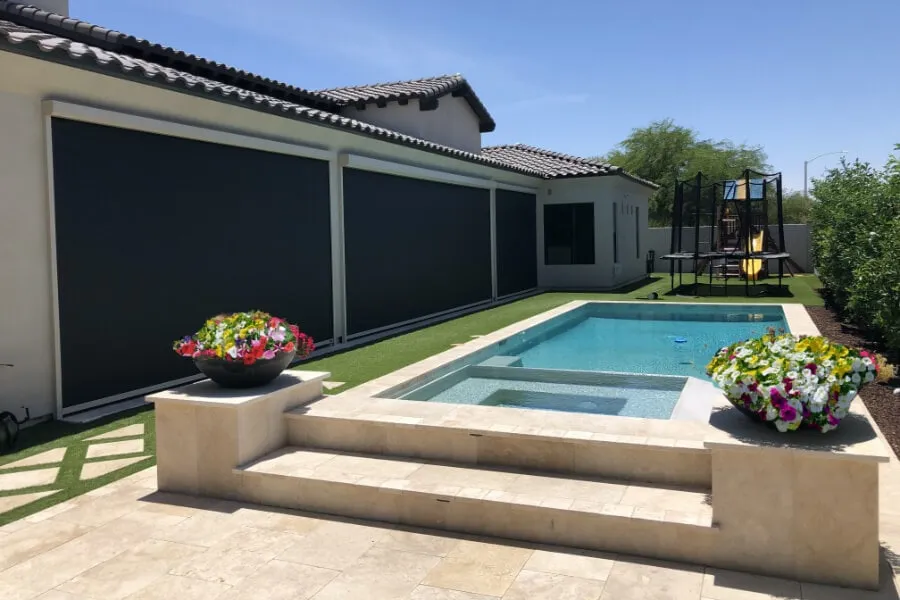
MENU

Spring is here, and so is the pollen! As the flowers bloom and trees begin to bud, many of us start battling itchy eyes, sneezing, and constant sniffles. While we welcome the beauty of the season, it’s hard to enjoy the outdoors when pollen and allergens seem to invade our homes. But what if there was a way to reduce the allergens entering your home while still allowing fresh air and sunlight to flow in? Enter solar screens.
You may already know that solar screens help reduce heat and glare, but did you know that they can also help protect your home from pollen and allergens? In this blog post, we’ll explore how solar screens work and how they can benefit allergy sufferers during the spring allergy season.
Pollen, dust, and other allergens are part of the seasonal transition, but they don’t have to make your home their playground. During the spring months, allergens can easily enter your home through open windows, doors, or vents. These particles can accumulate on surfaces, trigger allergies, and affect indoor air quality.
For those who suffer from seasonal allergies, even a small amount of pollen can lead to sneezing, itchy eyes, and sinus congestion. These symptoms can be especially disruptive when allergens make their way indoors and linger in your living space. That’s where solar screens come in as a practical solution to help mitigate allergens from entering your home.
Solar screens are custom-fit window coverings made from a special mesh material designed to block harmful UV rays while still allowing airflow and visibility. Unlike regular window screens, which are made of a larger mesh, solar screens feature a finer weave that’s more effective at reducing the amount of sunlight, heat, and glare that enters your home.
Solar screens are typically installed on the outside of windows, helping to reduce heat buildup inside, keeping your home cooler, and improving energy efficiency. They also provide privacy while maintaining clear visibility from the inside. The mesh design of solar screens is an excellent barrier against large particles like dust and pollen, acting as an additional filter for the air entering your home.
Yes, solar screens can indeed help with pollen and allergens! Thanks to their tightly woven mesh design, solar screens act as a barrier that filters out larger particles, including pollen, before they have a chance to enter your home. As windows are often opened during the spring to let in fresh air, solar screens can help prevent pollen from blowing inside while still allowing air circulation.
Solar screens are especially useful in areas where outdoor allergens like pollen are more prevalent, as they can help reduce the amount of allergens that accumulate inside. While solar screens won’t capture every single allergen, they significantly reduce the amount that can enter through open windows, which is an important first step in improving indoor air quality.
In addition to helping with pollen and allergens, solar screens offer a range of additional benefits, making them an essential home improvement for those looking to improve air quality, comfort, and convenience. Let’s explore some of the key advantages that solar screens provide for allergy sufferers.
Solar screens do much more than simply block pollen—they also act as a barrier to a variety of other airborne allergens, including dust, pet dander, and debris. Their fine mesh design helps filter out these particles before they can enter your home, significantly reducing the amount of allergens circulating indoors. This is especially helpful for individuals with asthma, seasonal allergies, or other respiratory conditions. By limiting allergens, solar screens help create a cleaner and healthier environment, making it easier to breathe freely without worrying about exposure to airborne irritants.
One of the main benefits of solar screens is their ability to regulate the amount of sunlight that enters your home. While traditional window treatments may block light completely or make rooms feel dim, solar screens allow you to maintain natural light while reducing glare and heat. This makes it possible to enjoy bright, sunlit spaces without the discomfort of excessive heat or harsh, glaring light. For those with light sensitivity or allergies, this can make a big difference in comfort, creating a more pleasant indoor environment without sacrificing sunlight or warmth.
Unlike traditional window tinting, which can completely block airflow, solar screens provide a perfect balance of fresh air and allergen control. They allow natural ventilation from open windows while minimizing the entry of pollen, dust, and other allergens. This means you can keep your windows open during allergy season to enjoy fresh outdoor air without worrying about the influx of outdoor pollutants. Solar screens ensure that your home remains comfortable by allowing you to enjoy fresh air without compromising on protection from allergens.
One of the often-overlooked benefits of solar screens is the lower maintenance they offer. With fewer allergens entering your home, you’ll likely find that your windows and sills stay cleaner for longer. Since solar screens help to prevent dust, pollen, and other airborne particles from accumulating inside, there’s less frequent need for deep cleaning. This can save time and effort in maintaining your home, making it easier to keep your living space clean and comfortable, especially during the high-pollen seasons.
To get the most benefit from solar screens, consider these tips:
As spring approaches and pollen fills the air, solar screens in Tucson, AZ, offer a practical and effective solution for reducing allergens inside your home. By filtering out pollen, dust, and other allergens, they help improve indoor air quality and provide a more comfortable living space for allergy sufferers. Plus, they offer additional benefits like temperature control, glare reduction, and enhanced privacy.
If you’re looking for a way to protect your home from allergens while still enjoying the benefits of natural light and fresh air, solar screens from Tucson Rolling Shutters & Screens are the perfect addition to your home. Contact us today to learn how they can help you keep your home allergen-free this spring or to schedule your free estimate!

